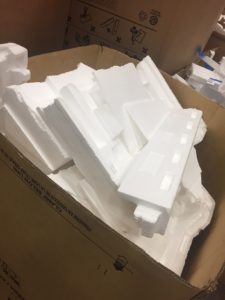Anyone who has ordered a piece of some-assembly-required furniture is probably familiar with expanded polystyrene, or EPS. The foam pieces that cushion furniture during transit are often made from this material. It’s commonly used as packing material because it’s light, durable and can be molded into any shape. (It’s not technically Styrofoam, though it’s often mistaken for the stuff.) EPS is also used to create many foam single-use products, like disposable cups.
 So EPS is everywhere, but it has a reputation as being hard to recycle. While individual households may not be able to easily recycle EPS waste, companies that generate a lot of expanded polystyrene waste have more options.
So EPS is everywhere, but it has a reputation as being hard to recycle. While individual households may not be able to easily recycle EPS waste, companies that generate a lot of expanded polystyrene waste have more options.
All About Expanded Polystyrene
Polystyrene is a versatile plastic polymer. Expanded polystyrene is made when beads of polystyrene are heated, expanded and pressed into molds. Manufacturers can make EPS in large blocks or into specific shapes. The latter option is used to make foam packaging for delicate items like electronics and breakables. For example, a furniture distributor that packs its furniture for delivery to a warehouse may use custom-molded EPS to perfectly cushion each piece during transit. Many other common foam products (such as take-out containers, egg cartons and packing peanuts) are also made from EPS.
Consumers may confuse expanded polystyrene with Styrofoam, which is a trademarked name for an extruded polystyrene product made by Dow. They may assume that the foam packaging used to cushion commercial products for packing is Styrofoam when in fact it’s technically EPS. The bottom line: When you hear someone describe an item as being made of Styrofoam, there’s a good chance they’re actually talking about EPS.
Like other plastic products, expanded polystyrene is made from crude oil, and its manufacturing process can be detrimental to the environment. Recycling this material means that less new expanded polystyrene has to be produced. Because there’s a lot of demand for recycled expanded polystyrene, companies that generate a lot of EPS waste can get paid for diverting this product to a recycling facility instead of a landfill.
Recycling Expanded Polystyrene
Recycling-savvy consumers may keep EPS out of their recycling bins because they’ve heard that Styrofoam and other foam products aren’t recyclable. Municipalities often refuse to accept EPS through curbside recycling because it’s not cost-effective for them to process it. But that doesn’t mean expanded polystyrene can’t be recycled. This product can find new life, via recyclers who have the capacity to process it. (Note, though, that even recyclers who do process EPS won’t take just anything made from this material. Things like used food-service containers and packing peanuts may not be accepted.)
One of EPS’s selling points is that it’s extremely lightweight. That’s great for keeping shipping costs down in products that are packed with EPS, but it’s not efficient for recyclers to transport large quantities of lightweight materials. The solution is to densify the EPS, essentially reversing the expansion process and removing the air that makes EPS so lightweight. There are a few ways to do this.
Recyclers that accept EPS first separate it out from other materials. The polystyrene may be fed into a grinder to cut it into small pieces, which can then be moved through equipment that presses the EPS down to a fraction of its original size, creating dense blocks of compressed material. The foam may also be heated until it essentially melts into a thick paste, which is extruded by a piece of equipment called a densifier and formed into blocks.
The densified expanded polystyrene can be then be transported and sold to manufacturers. Densified EPS may be shipped to countries such as Malaysia, or sent to one of a few American manufacturers that make recycled products using polystyrene. From there, the densified EPS can be transformed. It may be ground up, melted, pulled into strands and cut into tiny pellets, which are then used to make picture frames and clothes hangers. Recycled EPS is also sometimes used in construction, making composite building materials and architectural moldings.
If your business generates EPS waste, you need a system for managing it. Miller Recycling can help you evaluate your recycling processes and make recommendations so you get top dollar for your recyclable expanded polystyrene. Contact Miller Recycling today with any questions.

